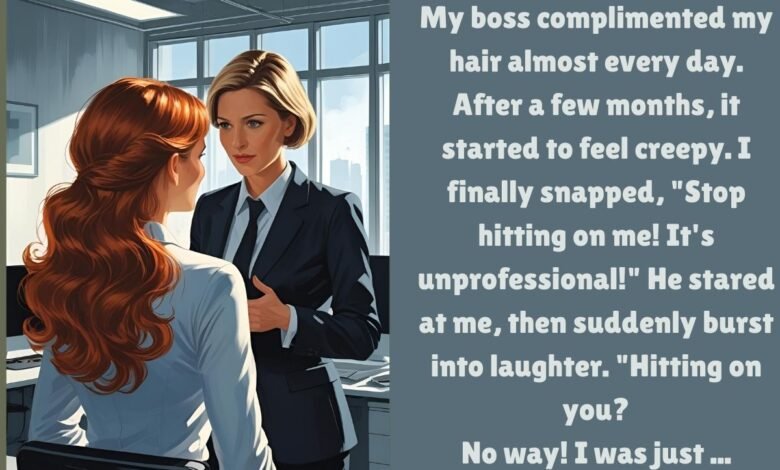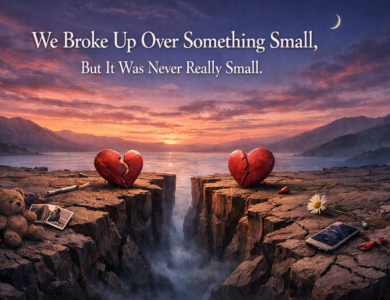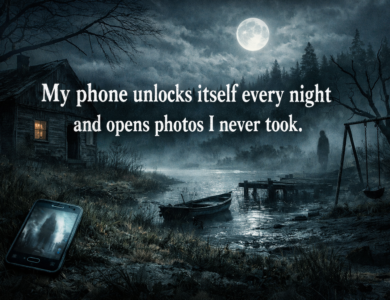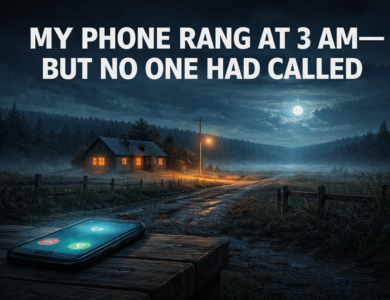
My boss complimented my hair almost every day. After a few months, it started to feel creepy. I finally snapped, “Stop hitting on me! It’s unprofessional!” He stared at me, then suddenly burst into laughter.
“Hitting on you? No way! I was just trying to figure out if it was a wig.”
My mouth fell open. The entire office went silent. He kept laughing while sipping his coffee, like it was the funniest thing in the world.
I was humiliated. My face burned red. People started whispering behind their monitors.
After that, the vibe at work changed. The daily compliments stopped, but so did the friendly chit-chat. My boss, Radu, avoided eye contact. He started forwarding things to me by email, even when we sat ten feet apart.
I felt like I’d messed everything up. Maybe I had overreacted. But could you blame me? No one compliments your hair every single day unless they’re trying something… right?
Still, I kept my head down. Focused on my tasks. I didn’t want to make things worse. I just wanted to work, collect my paycheck, and go home.
But the air around me never really cleared. I’d walk into the break room and conversations would go quiet. My team lead, Alina, started assigning me fewer important tasks. I wasn’t invited to meetings anymore.
I felt like a ghost in my own office.
One Friday, two weeks later, I stayed late to finish a report. As I packed up, I noticed Radu was still at his desk, staring at his screen with a weird look on his face.
I hesitated, then walked over. “Hey. I think we got off on the wrong foot… back there. I didn’t mean to accuse you. I just felt uncomfortable.”
He looked up, surprised. Then his expression softened. “No, you were right to speak up. I was being… weird. It wasn’t about your looks, though. I’m going to be honest with you, okay?”
I nodded, unsure what to expect.
He exhaled. “My sister used to wear wigs. She had alopecia. Your hair reminded me of hers. It was more… nostalgia than anything else. But I realize how it came off. I’m sorry.”
I stood there, stunned. That was not the explanation I’d imagined.
“Why didn’t you just say that from the beginning?” I asked, softer this time.
He shrugged. “Didn’t want to bring personal stuff into work. But I guess I already did.”
Something shifted between us after that. We didn’t become best friends or anything, but there was mutual respect.
But that didn’t fix everything else. The tension in the office remained. The gossip didn’t stop. I heard someone call me “the drama queen” under their breath during a meeting.
It got to a point where I dreaded waking up every morning. Work used to feel like a safe place. Now it felt like everyone had a target on my back.
So I started looking for new jobs.
I didn’t tell anyone. I just quietly applied during lunch breaks and late nights. A month passed. Then I got a callback from a small creative agency downtown. The role was similar, but the team was younger, more relaxed.
I interviewed, nailed it, and got the offer.
I handed in my resignation the next Monday.
Radu called me into his office. “Is it about what happened?”
“It’s not just that,” I said truthfully. “I just… don’t feel like I belong here anymore.”
He nodded slowly. “I wish I’d handled things better. And I’m sorry the team didn’t support you. I’ll write you a strong reference.”
I smiled. “Thank you.”
On my last day, no one threw me a goodbye party. No cupcakes, no cards. Just a few cold waves and one awkward hug from the intern.
But I walked out with my chin up. I didn’t owe anyone an apology for standing up for myself.
The new job was a breath of fresh air.
People there were loud, messy, honest. If someone liked your hair, they said it once and moved on. If they had a problem, they told you to your face—not behind your back.
My new manager, Andreea, was blunt but fair. She gave feedback straight up and praised effort, not just results. I thrived there.
Within six months, I got a raise and was leading two projects.
But then something unexpected happened. My old company reached out.
Radu emailed me. “Hey, hope you’re doing well. Any chance you’d be open to coming back for a coffee?”
I almost deleted it. But something in me was curious.
We met at a quiet café near the old office. He looked more tired than I remembered.
“I won’t waste your time,” he began. “After you left, two more people quit. Then someone filed an anonymous complaint about the toxic environment. HR investigated. Alina was let go.”
I blinked. “Wait. Alina?”
He nodded. “She was the one fueling the gossip. Turns out she’d been creating division on the team for over a year.”
I remembered the way Alina would “accidentally” CC people on private emails. The way she’d smirk after whispering something into someone’s ear. It all made sense now.
Radu leaned forward. “I didn’t realize how bad things had gotten until you left. You were the first to speak up, and it made others reflect too.”
I sat back, unsure what to feel.
He continued, “We’re rebuilding now. New team leads. More open communication. I wanted to ask if you’d consider coming back. Higher role. Better pay.”
I shook my head gently. “Thank you. But I’m happy where I am.”
He nodded, respecting that. “I understand. Just… wanted you to know your voice made a difference.”
I left that café with a strange sense of closure.
Back at my new job, I started mentoring one of the interns, a nervous girl named Sorina. She reminded me of myself—quiet, hardworking, always second-guessing.
One day, I caught her hesitating to speak up in a meeting.
Afterward, I pulled her aside. “You had a great point back there. Why didn’t you say it?”
She shrugged. “Didn’t want to sound stupid.”
I smiled. “Let me tell you a story.”
I shared the short version of my old job. How speaking up cost me comfort, but earned me clarity. How some risks feel messy in the moment but change everything in the long run.
She nodded, taking it in.
From that day on, she started showing up differently—more confident, more involved.
And that’s the thing. Sometimes, you don’t see the impact of your choices right away.
But silence doesn’t build safety. Speaking up—even when it’s messy—can crack things open.
Looking back, I’m glad I snapped that day. It wasn’t graceful. It wasn’t polite. But it was real. And it started a chain reaction I couldn’t have predicted.
If you’re reading this and you’re sitting on your voice, your discomfort, your truth—this is your sign.
Speak up.
You might just save more than yourself.
If this story resonated with you, give it a like and share it with someone who needs that push today. You never know who’s waiting for permission to be brave.
Read More: My mom d!ed when I was little







